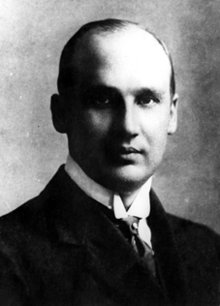Ivar Kreuger
|
|
Ivar Kreuger (March 2, 1880–March 12, 1932) was a Swedish financier, entrepreneur and industrialist. In the time between the two world wars, he was one of the most powerful businesspeople in Europe, basing his business activities on match production. He gained a match monopoly and became known as the "Match King".
He was born in Kalmar, the eldest son of the banker, industrialist and Russian consul Ernst Kreuger and his wife Jenny. In school Ivar skipped ahead two classes to graduate at age 16, continuing his studies at the Royal Institute of Technology in Stockholm where he graduated with two Master's degrees from the faculties of mechanical and civil engineering, at the age of 20.
From the turn of the century he spent seven years travelling and working abroad as an engineer in the U.S., Mexico, and South Africa, among other countries, before returning home. In 1908, he formed construction firm Kruger & Toll, with fellow engineer Paul Toll. The firm was a success and won prestigious contracts like the construction of the Stockholm Stadium and the department store Nordiska Kompaniet in Stockholm.
In 1917 Kreuger formed Svenska Tändsticks AB (Swedish Match), which by expanding through acquisition of national monopolies became the worlds largest match manufacturer. He set up an affiliate to Kruger & Toll in the United States and formed the International Match Corporation which eventually came to control two thirds of the world production in matches.
After founding the pulp manufacturer SCA in 1929 Kreuger were able to acquire the majority shares in telephone company Ericsson, the mining company Boliden, and major interests in the ball bearing manufacturer SKF, the bank Skandinaviska Kreditaktiebolaget as well as others. Abroad he acquired Deutsche Unionsbank in Germany and Union de Banques á Paris in France and by 1931 an estimated 200 companies were controlled by Kreuger. However the stock market crash in New York in 1929 turned out to be a major factor in the liquidity crisis that would be fatal to both Kreuger and his Empire.
At the peak of his career the Kreuger fortune was estimated at a value of 30 billion Swedish kronor in 1929, equivalent to approximately 100 billion USD in 2000. In the same year the total loans made by Swedish banks were barely 4 billion SEK, and an average worker had an annual salary of 3,195 SEK.
On March 12, 1932 Ivar Kreuger was found dead in a hotel room in Paris. Evidence suggested that he had shot himself, committing suicide rather than face his creditors. Later rumors (or rather conspiracy theories) claimed that Kreuger's wounds had not been self inflicted, but the death nevertheless precipitated the Kreuger Crash which hit both investors and the group companies hard. Several thousand Swedes lost their life savings in the Kreuger Crash.
He is interred in the Norra begravningsplatsen in Stockholm.
| Contents |
Old fragments of info
The following is from Ivan Kreuger and Kreuger, Ivar
Kreuger founded Kreuger & Toll, a match conglomerate. In 1908 he founded a real estate company, Kreuger & Toll, together with a young colleage, Paul Toll.
Later on, he decided to switch markets and concentrate on producing matches; in 1913 he merged several Swedish match factories into Svenska Tändsticks, a company that was to become synonymous with Kreuger's control over the match market in a time when Sweden was an important match exporting country and matches were much more prevalent than today, lighters not being very common.
He maintained control by hundreds of subsidiary shell companies in a deal that was essentially a huge pyramid scheme. He hid his manipulations by cooking the books and insisting that his finances remained unaudited. In his heyday, he controlled at least 75% of the world's match production.
In the years when Europe was suffering from the problems of the Great Depression, Kreuger's companies would often give loans to European governments needing money, and as a security the government would grant his empire the match monopoly in this country. In 1929 Kreuger loaned equal to $28 million to Romania. In return, he gained a monopoly in match sales. This debt remained unpaid to 2002.
Kreuger did not limit himself to mere matches but gained control of most of the forestry industry in the northern Sweden and planned to became a head of a cellulose cartel.
By 1932, rumours had started spreading that Kreuger & Toll and other companies forming Kreuger's empire had become financially unstable. Securities of Kreuger & Toll were very wanted in the Wall Street. When the company went bankrupt in 1932, claimed assets worth of $250 million turned out to be nonexistent. Investors lots millions.
Fictional depictions
Ivar Kreuger was the inspiration for the thinly disguised "Bjorn Falkner", a character in Ayn Rand's 1935 hit Broadway play, Night of January 16th.
Source
- Torsten Kreuger: Die Wahrheit über Ivar Kreuger, West Berlin: Ullstein Verlag, 1968
External links
- Ivar Kreuger (http://www.lysator.liu.se/runeberg/authors/kreugiva.html) - Bibliography at Project Runeberg
- Ivar Kreuger (http://www.svt.se/drama/kreuger/) - A television mini series (in Swedish)
- Ivar Kreuger (http://www.ivarkreuger.com/kreuger.htm) - at www.ivarkreuger.comde:Ivar Kreuger

